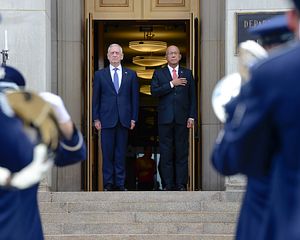On September 27, the Philippines and the United States held the annual Mutual Defense Board-Security Engagement Board Meeting (MDB-SEB). As a framework for defense and security cooperation, the MDB-SEB provides a regular opportunity for the allies to exchange views on shared security concerns and plan the range of military activities they will conduct the following year, including the annual Balikatan Exercises. During the MDB-SEB, Armed Forces of the Philippines (AFP) Chief of Staff General Carlito Galvez Jr. and U.S. Indo-Pacific Commander Admiral Philip Davidson signed off on a total of 281 security cooperation activities focusing on counterterrorism, maritime security, cybersecurity, and humanitarian assistance/disaster relief (HADR), thereby increasing the number of engagements for 2019.
In an interview with the U.S. Embassy in the Philippines on September 27, Davidson described the MDB-SEB meeting as “part of an annual rhythm to show that the Philippines and U.S. are demonstrable friends, partners, and allies.” He also argued that bilateral military activities between the allies aid them in addressing “mutual security concerns.” In particular, as regards the South China Sea, Davidson noted that China has “militarized outposts” in the disputed waters, threatening “the sovereignty of several nations around the South China Sea” and potentially limiting the “free flow of trade.” Underscoring the South China Sea disputes as a shared security concern, he further expressed that the Philippines and United States are “talking about” the continuing threat posed by China’s activities in the area, where Manila and Beijing have conflicting territorial claims.
The MDB-SEB meeting follows the official visit of Philippine Defense Secretary Delfin Lorenzana to Washington, D.C. from September 18 to 19, during which he met with U.S. Defense Secretary James Mattis and State Secretary Michael Pompeo to discuss an array of security concerns, including maritime security and the Philippines’ military modernization. During his meeting with Lorenzana, Mattis reiterated that the United States will continue to stand with the Philippines in support of a “safe, secure, prosperous, and free Indo Pacific region.” Meanwhile, during their meeting, Lorenzana and Pompeo reaffirmed the commitment of the allies to the Mutual Defense Treaty of 1951 and discussed cooperation in addressing regional security challenges, including militarization of the South China SEa and the threats posed by terrorism. Further, Pompeo affirmed the “readiness of the U.S.” to continue its strong support for AFP modernization.
Taken together, these engagements indicate that Philippines-U.S. security cooperation remains intact at the strategic and operational levels and that the allies maintain open channels for defense policy coordination. However, reinforcing the Philippines-U.S. alliance within an evolving regional security environment still implies the need to address a two-pronged challenge: insulating the alliance from the political dynamics governing Philippines-China relations and projecting credible extended deterrence in the South China Sea.
Consistent with Philippine President Rodrigo Duterte’s policy of deepening economic relations with Beijing and assuaging tensions in the South China Sea, the Philippines has shelved the favorable 2016 Arbitral Ruling, refrained from openly criticizing China’s military activities in the area, and exercised caution in conducting joint military activities with the United States to avoid directly antagonizing China. This has resulted in the suspension of joint patrols in the South China Sea in 2016, the apparent shift of joint military exercises from traditional to nontraditional security concerns as early as 2017, and the undesirable pace of implementing the construction of military facilities under the 2014 Enhanced Defense Cooperation Agreement. These constraints translated to the limited projection of extended deterrence in the South China Sea, within which China has reportedly displayed unfazed assertiveness in harassing Filipino fishermen and sending radio warnings to Philippine military aircraft despite the red lines drawn by the Manila in May of this year.
In addressing this two-pronged challenge, the Philippines and United States may explore two initiatives. First, together with Japan and Australia, the allies may consider the conduct of a quadrilateral maritime security exercise that combines the elements of the KAKADU and CARAT Exercises. These exercises are effective since while the former integrates air and naval drills in conducting maritime security operations, the latter features a rotational hosting arrangement that gives it a multilateral character. In this light, a maritime security exercise combining these features can allow the Philippines and the United States to project deterrence within a multilateral framework that may limit China’s response and lessen diplomatic repercussions.
Second, the allies may encourage U.S. investment in the nascent Philippine defense industry to harness the economic potential of promoting closer Philippines-U.S. defense relations and explore the possibility of transferring defense technology to the Philippines through public or private joint development projects. Such an initiative will not only add another layer of relevance in pursuing deeper security relations but will likewise provide support to the AFP modernization program.
Through these initiatives, both countries may overcome challenges in reinforcing their alliance within an evolving Indo-Pacific region.
Christian Vicedo is an independent defense and security analyst based in Manila. His writings have appeared in The Diplomat, East Asia Forum, Pacific Forum, and EurasiaReview

































